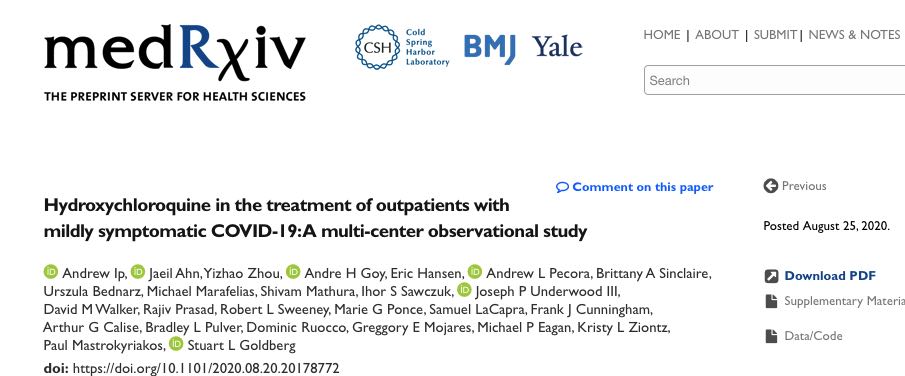Source: Medrxiv
Abstract
Background:
Hydroxychloroquine has not been associated with improved survival among hospitalized COVID-19 patients in the majority of observational studies and similarly was not identified as an effective prophylaxis following exposure in a prospective randomized trial. We aimed to explore the role of hydroxychloroquine therapy in mildly symptomatic patients diagnosed in the outpatient setting.
Methods:
We examined the association between outpatient hydroxychloroquine exposure and the subsequent progression of disease among mildly symptomatic non-hospitalized patients with documented SARS-CoV-2 infection. The primary outcome assessed was requirement of hospitalization. Data was obtained from a retrospective review of electronic health records within a New Jersey USA multi-hospital network. We compared outcomes in patients who received hydroxychloroquine with those who did not applying a multivariable logistic model with propensity matching.
Results:
Among 1274 outpatients with documented SARS-CoV-2 infection 7.6% were prescribed hydroxychloroquine. In a 1067 patient propensity matched cohort, 21.6% with outpatient exposure to hydroxychloroquine were hospitalized, and 31.4% without exposure were hospitalized. In the primary multivariable logistic regression analysis with propensity matching there was an association between exposure to hydroxychloroquine and a decreased rate of hospitalization from COVID-19 (OR 0.53; 95% CI, 0.29, 0.95). Sensitivity analyses revealed similar associations. QTc prolongation events occurred in 2% of patients prescribed hydroxychloroquine with no reported arrhythmia events among those with data available.
Conclusions:
In this retrospective observational study of SARS-CoV-2 infected non-hospitalized patients hydroxychloroquine exposure was associated with a decreased rate of subsequent hospitalization. Additional exploration of hydroxychloroquine in this mildly symptomatic outpatient population is warranted.
Related:

